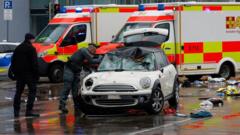In a shocking event, a 24-year-old Afghan asylum seeker, identified as Farhad N., drove a car into a crowd during a transport workers' union rally in Munich, injuring at least 30 people. The incident happened on Thursday at around 10:30 a.m. (09:30 GMT), just days before the country’s federal elections set for February 23. Authorities arrested the suspect on-site and are treating the incident as a suspected terrorist act, with police revealing that counter-terrorism units have taken over the investigation due to indications of an "extremist background."
This violent occurrence brings to the forefront discussions about immigration and security, especially in light of recent high-profile attacks in Germany, some of which have been attributed to immigrants. Chancellor Olaf Scholz condemned the incident and emphasized that the suspect must face punishment and subsequently be deported. Just before the Munich Security Conference, scheduled to host numerous global leaders, including Ukraine's President Volodymyr Zelensky and U.S. Vice President JD Vance, the car ramming has cast a shadow over the political landscape.
Eyewitnesses described the chaos, with people fleeing into shops and homes as the car barreled into the crowd near police vehicles. Munich's mayor, Dieter Reiter, confirmed that children were among those affected, describing the scene as “distressing.”
The driver, asylum status and previous deportation order add layers to the investigation. Reports suggest he entered Germany as a minor in 2016, had his request for asylum denied the following year, and was scheduled for deportation in autumn 2020. However, Bavarian interior minister Joachim Herrmann noted he had not been removed due to concerns about security in Afghanistan. At the time of the incident, the suspect held a valid residence permit.
Bavaria's Premier Markus Söder labeled the incident a "suspected attack," expressing urgency for changes in the country to enhance safety. This incident resonates deeply with citizens, who are reminded of the December attack in Magdeburg, which resulted in six deaths and 300 injuries.
Authorities continue to investigate, seeking information from witnesses who may have captured footage of the incident. This attack comes in the wake of increasing concerns regarding immigration policies in Germany, especially with the far-right Alternative for Germany (AfD) party gaining traction in public opinion polls ahead of the elections. Chancellor Scholz revealed plans to expedite deportations of serious criminals, highlighting ongoing tensions regarding immigration reform that demand attention in political discourse.
This violent occurrence brings to the forefront discussions about immigration and security, especially in light of recent high-profile attacks in Germany, some of which have been attributed to immigrants. Chancellor Olaf Scholz condemned the incident and emphasized that the suspect must face punishment and subsequently be deported. Just before the Munich Security Conference, scheduled to host numerous global leaders, including Ukraine's President Volodymyr Zelensky and U.S. Vice President JD Vance, the car ramming has cast a shadow over the political landscape.
Eyewitnesses described the chaos, with people fleeing into shops and homes as the car barreled into the crowd near police vehicles. Munich's mayor, Dieter Reiter, confirmed that children were among those affected, describing the scene as “distressing.”
The driver, asylum status and previous deportation order add layers to the investigation. Reports suggest he entered Germany as a minor in 2016, had his request for asylum denied the following year, and was scheduled for deportation in autumn 2020. However, Bavarian interior minister Joachim Herrmann noted he had not been removed due to concerns about security in Afghanistan. At the time of the incident, the suspect held a valid residence permit.
Bavaria's Premier Markus Söder labeled the incident a "suspected attack," expressing urgency for changes in the country to enhance safety. This incident resonates deeply with citizens, who are reminded of the December attack in Magdeburg, which resulted in six deaths and 300 injuries.
Authorities continue to investigate, seeking information from witnesses who may have captured footage of the incident. This attack comes in the wake of increasing concerns regarding immigration policies in Germany, especially with the far-right Alternative for Germany (AfD) party gaining traction in public opinion polls ahead of the elections. Chancellor Scholz revealed plans to expedite deportations of serious criminals, highlighting ongoing tensions regarding immigration reform that demand attention in political discourse.






















